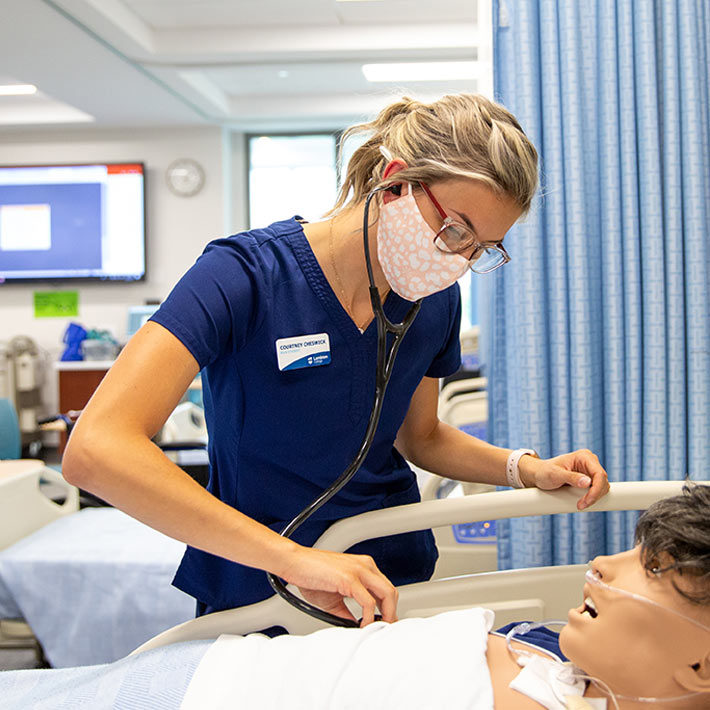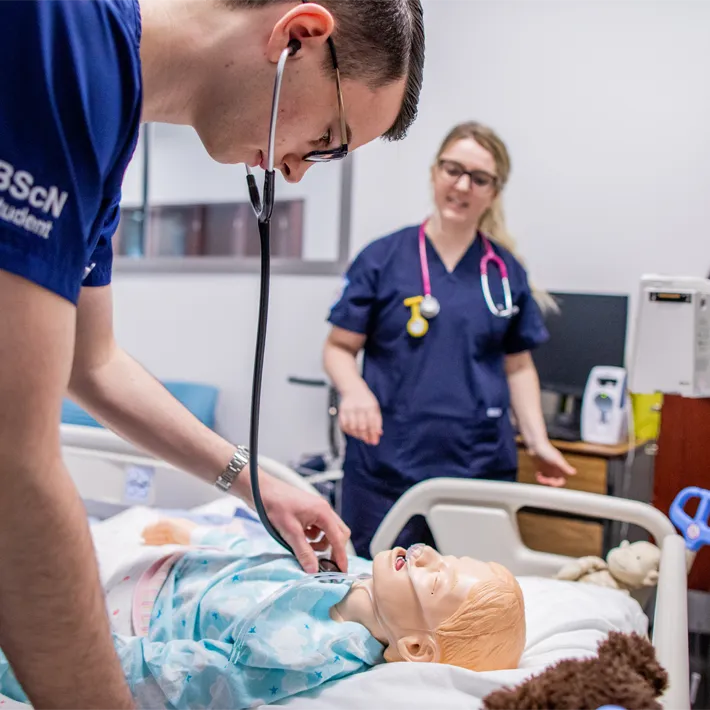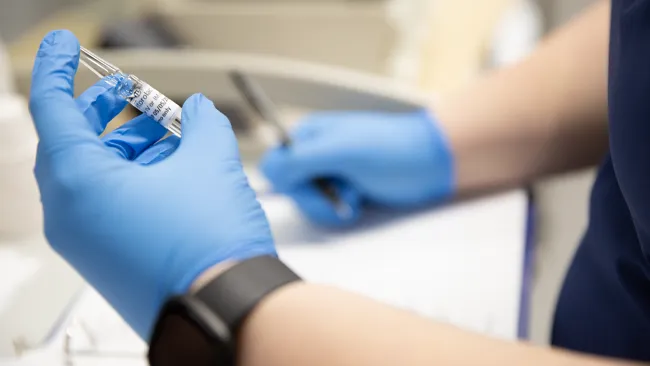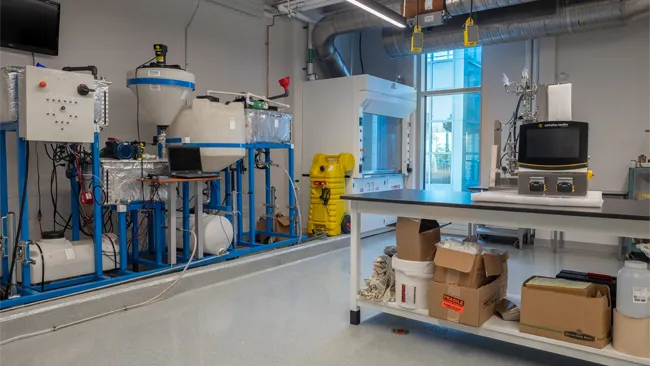

Pre-Health Sciences Pathway to Advanced Diplomas & Degrees
Overview
Academically prepare yourself for the Honours Bachelor of Science - Nursing program and gain a competitive edge in gaining admission to a very competitive program.
This eight-month program offers a transition opportunity for secondary school graduates and adult learners who lack the prerequisites to be accepted into the four-year Honours Bachelor of Science - Nursing (BSNL) degree program offered in its entirety at Lambton College, beginning Fall 2023. This unique program has been designed to provide students with the academic preparation required for success in the Honours Bachelor of Science - Nursing program, as well as learning how to be successful in a post-secondary learning environment.
Students in this program must apply to the BSNL program by February 1 of the calendar year in which they wish to be considered for admission to start the program to ensure that all additional requirements are met for the BSNL program.
The benefits in academic preparedness, and the competitive advantage in gaining admission into the BSNL program for students who complete the Pre-Health Sciences Pathway to Advanced Diplomas & Degrees program has been well documented.
All requirements must be completed by the end of the winter term.
Admission Requirements
O.S.S.D. or equivalent with:
- Grade 12 English C or U (minimum grade of 55%)
- Grade 11 or 12 Chemistry C or U (minimum grade of 60%)
- Grade 11 or 12 Biology C or U (minimum grade of 60%)
- Grade 12 Mathematics C or U (recommended)
Planning to Apply to Honours Bachelor of Science - Nursing Program
If you're planning on applying to the Honours Bachelor of Science - Nursing (BSNL) program after taking this preparatory program, you should be aware of the minimum requirements to be considered for admission.
Although it is possible to graduate from the Pre-Health Sciences Pathway to Advanced Diplomas & Degrees program by achieving a grade of D (50%) that will not be enough to gain admission to BSNL. Students in this program will also be well prepared for other diploma and advanced diploma level studies in related health fields.

To be considered for admission to the Honours Bachelor or Science - Nursing program, you must achieve the following minimum requirements in the Pre-Health Sciences Pathway to Advanced Diplomas & Degrees program:
- Program GPA of at least 2.7
- A combined average of at least a B- (70%) in BIO-1205 and BIO-1055
- A combined average of at least a B- (70%) in CHM-1255 and CHM-2255
- Passing grade in all courses in both terms
Costs
- Year 1 $4,156.71
Please Note: These fees apply to the 2025-2026 academic year and are subject to change. Fees do not include books (unless specifically noted), supplies or living costs.
Additional Fees
-
Textbooks - Term 1$900.00
-
Textbooks - Term 2$150.00
-
Supplies$200.00
Technology Requirements
In order to keep pace with the requirements of each and every course in your program, Lambton College requires that each student have access to a laptop while studying at our college.
Labs & Equipment
Courses
Introduction to Physical Anthropology
As Canadians move to recognize, rebuild, and construct a more equitable and sustainable future, ANT 1003 reminds us of our global and also personal interconnection to the world at large through the lens of human bio-cultural evolution, genetic inheritance, social and cultural innovation. Biodiversity, global responsibility and engaged interdependence are core themes running throughout ANT 100's learning outcomes and applied learning assignments (ALA). Each of the five units includes opportunities to apply learning through small group dialogue, gamification, and personal reflection with the goal of building greater self-awareness as part of a wider interdependent community.
Cell Physiology
This course in cell physiology includes the core topics of the characteristics of life, microscopy, applied chemistry and biochemistry, cell structure and function, cellular respiration, molecular biology of the gene, Mendelian genetics, DNA replication and protein synthesis. Laboratory exercises are performed in order to emphasize and apply the topics discussed in class.
General Chemistry for Nursing I
This course provides an understanding of fundamental chemistry with a focus on health related concepts. The theory portion includes calculations involving chemical quantities and measurements of matter, representations of atoms, ions and molecules, the Periodic Table, oxidation-reduction reactions and gas chemistry. The laboratory portion is designed to relate selected theoretical concepts to practical experiments.
Critical Thinking & Writing
This writing course challenges students to explore diverse opinions and articulate their own perspectives clearly and persuasively. Through critical reading, students will develop skills in synthesis, analysis, comparison, and response, striving for clarity and diplomatic expression of their opinions based on factual evidence. Students will practice various rhetorical strategies of persuasion and hone their writing to ensure precision and accuracy in their messages. This course lays the foundation for a subsequent research-writing course, equipping students with essential skills for academic success.
Mathematics for Health Sciences I
This course is designed to prepare learners to apply math concepts in health care settings. Learners will develop essential critical thinking and problem-solving skills through exposure to application problems, including dosage calculations, IV calculations, and mixtures. The course helps learners build a solid foundation in arithmetic, algebra, and geometry. Other topics include percentages, ratios and proportions, dimensional analysis, manipulating formulas, solving equations, and graphing linear functions.
Sociology I
Focusing on the Canadian perspective SOC 1003 explores the intersectional influences on behavior within the context of human group life. The sociological perspective, data collection, socialization, crime, and the dynamics of group structure and stratification are critically assessed against the backdrop of global interdependence and socio-cultural change. Small group discussion and gamification of materials all offer an enhanced course experience for individual growth and understanding of sociology.
Introduction to Biology
This course is designed to introduce the student to basic human anatomy and physiology through the study of organ systems including the following: nervous, circulatory, respiratory, digestive and urinary. General organization of the body, cells, tissues, and organs will also be considered.
General Chemistry for Nursing II
This course is intended to acquaint the student with the basic principles underlying the study of bonding, solutions, gaseous and ionic equilibria and acid-base reactions. Organic functional groups and biochemical structures are introduced. These concepts are supported and reinforced in the laboratory portion of the course
Communications for Health
This course, designed for students in the health field, further develops students' communication proficiency. Students create workplace documents and research reports and share their findings through oral presentations. Advocacy and peer education will drive the research and documentation process. Current health issues and research will serve as the impetus for creation of informed research reports and presentations.
Mathematics for Health Sciences II
This course is a continuation of MTH-1623 and is designed to further algebra skills and introduce statistical processes. Learners will develop essential critical thinking and problem-solving skills through exposure to application problems, including isotope half-life, pH, and statistics relating to the health-care field. This course covers algebraic topics such as systems of linear equations, exponential equations, and logarithmic equations. Statistical concepts include descriptive statistics, basic probability, regression analysis, binomial and normal distributions, and confidence intervals.
English Literature I
This course looks at a range of literature spanning from Victorian times to the modern era. Students examine a novel, short stories, a play, and poetry and explore literature's power to shape perceptions and promote empathy in readers.
Introduction to Cultural Anthropology
Employing the anthropological perspective this course examines culture and culture "life ways" through the lens of engaged interdependence, global socio-economic sustainability, and inclusion. Cross-cultural comparison, the nature of world order, decolonization, and the construction of identify and gender through culture are core themes running throughout ANT 200's learning outcomes and applied learning assignments (ALA). Each of the five units includes opportunities to apply learning through small group dialogue, gamification, and personal reflection, with the goal of building greater self-awareness as part of a wider interdependent community.
General Education Elective
Contact
School of Fire Science, Health & Community Services
Program Information
After Graduation
Pathway Opportunities

Our graduates qualify to apply for any other Health Sciences program at Lambton College or any other Ontario college, provided they meet the respective minimum grade requirements.
More Information
Skill Demands
Nursing is a very vigorous program with respect to skill demands. Some students with disabilities may require academic accommodation to equalize opportunities to meet the academic demands of a course or a program.
Technology Requirements
It is recommended that students purchase a laptop with a Windows operating system.
Internet Speed Requirements
For best performance for students learning remotely, an internet connection with a minimum of 40 Mbps download and 10 Mbps upload speed is recommended in order to effectively use video conferencing and remote lecture delivery software as well as, other online resources remotely. Due to the large area over which students may be dispersed, we are unable to recommend a specific provider, so you will need to inquire around your area to find one that best suits your needs.
Minimum Laptop Requirements
In order to access the internet and virtually-delivered software and courseware, student laptops should include the following at a minimum. By meeting the following specifications, students will be equipped to access software and courseware on their laptop through the internet:
- Intel i5 8th Gen Processor or equivalent
- 16 GB of RAM (with a minimum of 8 GB)
- 100 GB HDD or more
- HD Graphics
- Webcam with a microphone
- Wireless 802.11n/ac 5ghz capable
- Windows Operating System (Windows 11)
Please note that Chromebooks and MacBooks may not support all software required for your program; students should verify compatibility with their professors.
Software
To ensure students are getting the most our of their classroom experience, some software will be required.
Lambton College has made this software easily accessible online. Students can leverage our Microsoft Office 365 software packages and services. In addition, much of the software you require for your courses will be available on demand for use on any device - on or off campus.

